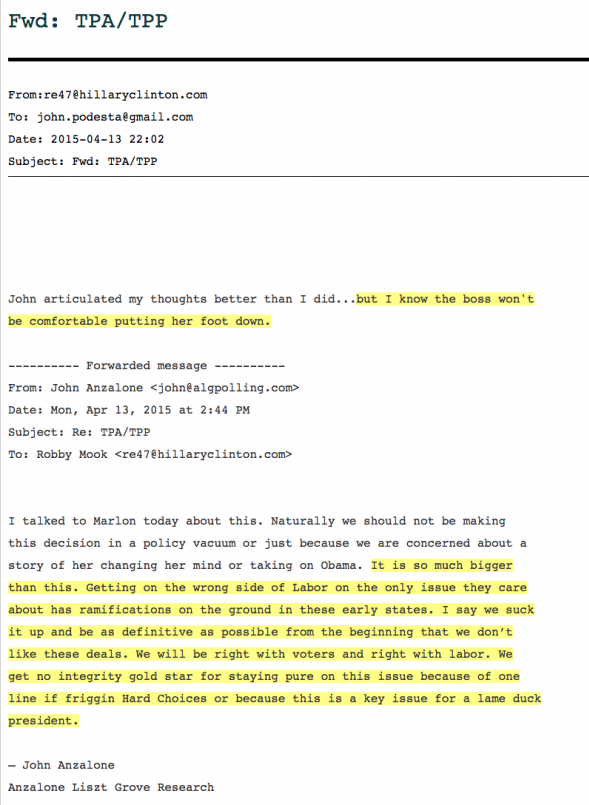Watching Hillary evolve on TPP is a wonder to behold!
WikiLeaks has just released an email that appears to crystalize the moment of Hillary Clinton’s latest ‘position’ on the controversial TPP trade agreement. (Scroll down for info on what TPP really is.) The email is from Hillary’s top campaign manager, Robby Mook, and it’s passing on advice sent from a political consultant, Mr. John Anzalone.
 John’s own website touts his, “polling experience,” and ability to help ‘candidates and corporations’ with “message development.” Trust me, all this set-up makes the following leaked emails more hilarious and pathetic. Just look at that face. Clearly, Mr Anzalone is the man to call when you need a little help duping the public.
John’s own website touts his, “polling experience,” and ability to help ‘candidates and corporations’ with “message development.” Trust me, all this set-up makes the following leaked emails more hilarious and pathetic. Just look at that face. Clearly, Mr Anzalone is the man to call when you need a little help duping the public.
Hilariously, they don’t even think Sec. Clinton is going to like their proposal.
A little background on Hillary Clinton’s previous positions, she really did call it the “gold standard,” despite her denials in the last debate.
Just one month later than the email contemplating her flip-flop, here’s her inner circle assuming that she supports TPP.
#Podestaemails5 Hillary's inner circle assumes she supports TPP. Search "TPP" and #PodestaEmails5 for more https://t.co/hjbhzMMDCc pic.twitter.com/6RKHcYP6xB
— iroots.org activism (@irootsorg) October 13, 2016
Clear as mud, isn’t it?
By the way, it’s looking like the ’08 Clinton campaign really was pushing a birther narrative, scaremongering about Obama growing up among MUSLIMS and doing cocaine.
Appears Hillary really is original birther. Read how in 08 they contemplate framing Obama for cocaine and…MUSLIMS https://t.co/UFCllaybCW pic.twitter.com/h4T8kOM3Uf
— iroots.org activism (@irootsorg) October 14, 2016
BACKGROUND:
The Trans-Pacific Partnership (TPP) or Trans Pacific Partnership Agreement (TPPA) is a trade agreement among twelve of the Pacific Rim countries – notably not including China. (Wikipedia)
Here are the biggest criticisms.
What Is the Trans-Pacific Partnership Agreement (TPP)?
TPP is a secretive, multinational trade agreement that threatens to extend restrictive intellectual property (IP) laws across the globe and rewrite international rules on its enforcement. The main problems are two-fold:
(1) Digital Policies that Benefit Big Corporations at the Expense of the Public: The IP chapter would have extensive negative ramifications for users’ freedom of expression, right to privacy and due process, as well as hindering peoples’ abilities to innovate. Other chapters of the agreement encourage your personal data to be sent borders with limited protection for your privacy, and allow foreign corporations to sue countries for laws or regulations that promote the public interest,
(2) Lack of Transparency: The entire process has shut out multi-stakeholder participation and is shrouded in secrecy….
More from EFF.

